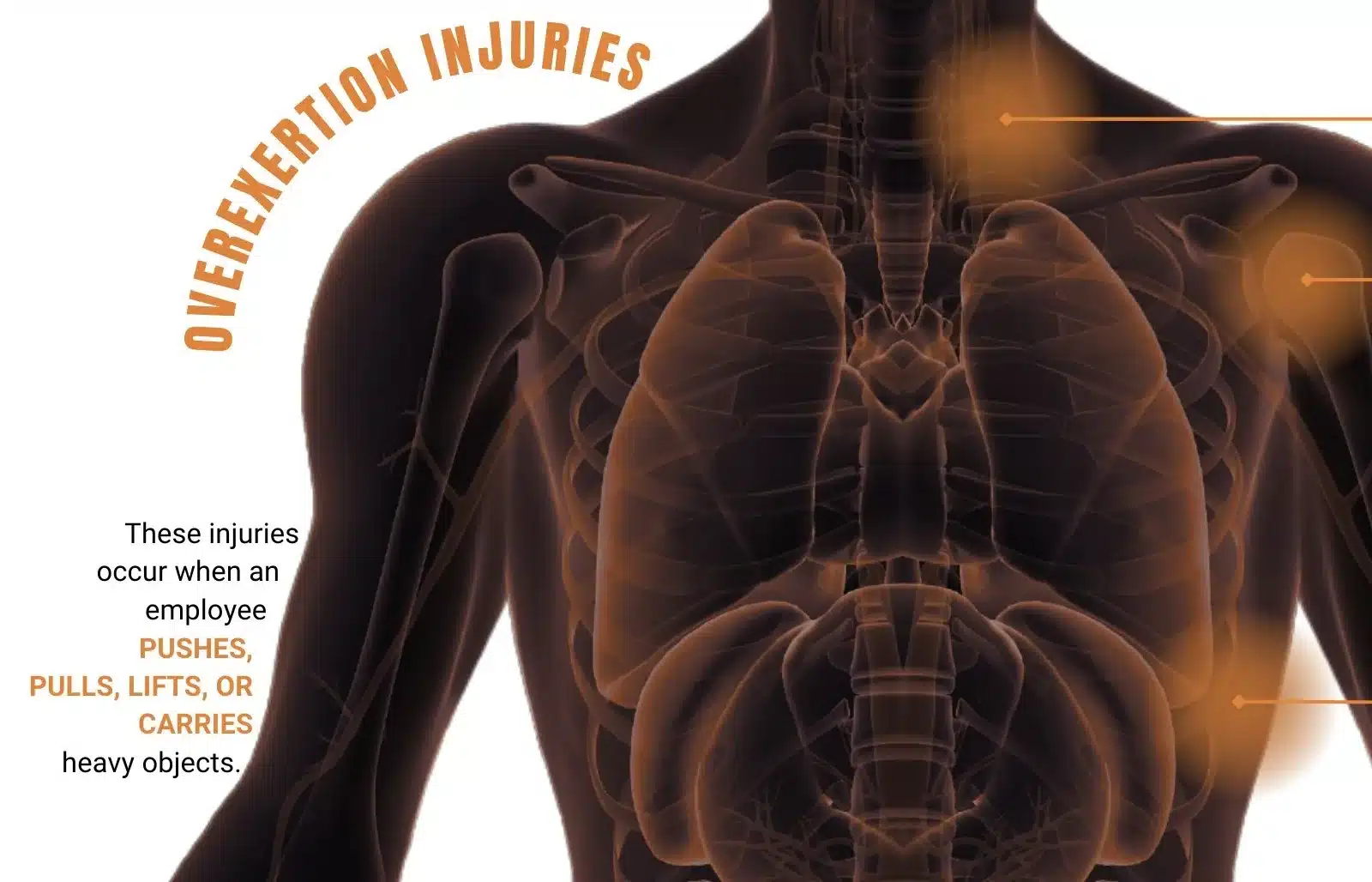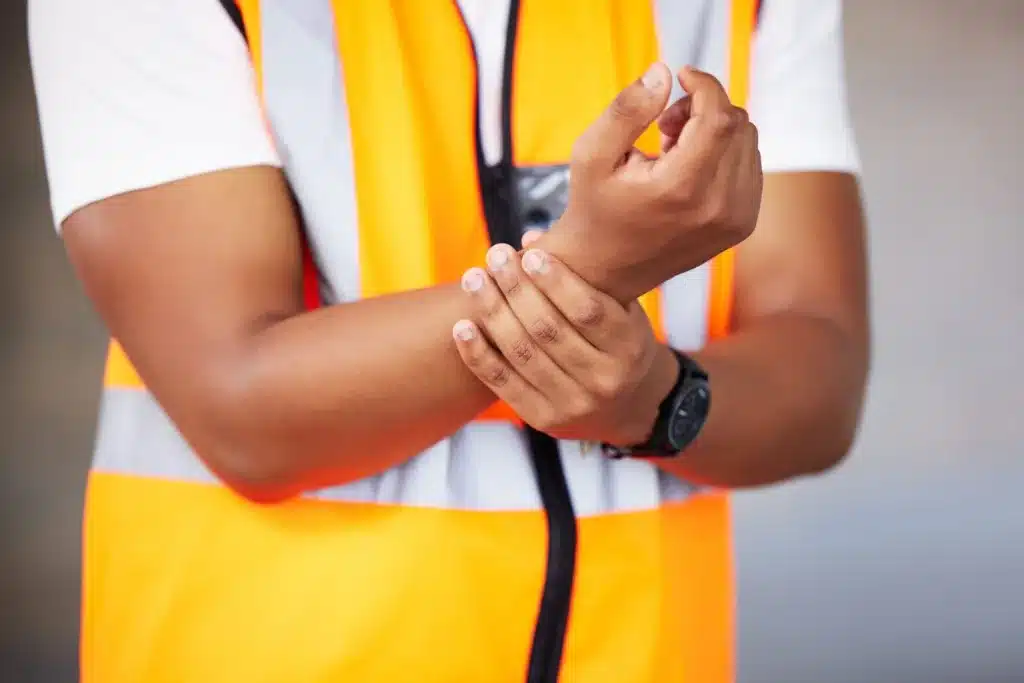What Is an Overexertion Injury and How Is It Covered by Workers’ Comp?
Overexertion is one of the leading causes of workplace injuries, and it often goes unnoticed until it becomes serious. Whether you’re a warehouse worker lifting heavy boxes or an office employee reaching or twisting the wrong way, overexertion can result in painful, disabling injuries. Fortunately, workers’ compensation laws in Florida offer protection and financial support for employees hurt due to overexertion on the job.
At RTRLAW, our experienced workers’ compensation attorneys help injured workers understand their rights, file their claims, and recover the full benefits they’re entitled to.
How Do Most Overexertion Injuries Occur in the Workplace?
Overexertion occurs when physical effort exceeds the body’s capacity to handle it. This leads to musculoskeletal strain or trauma, especially over time. These injuries can develop suddenly or advance as time goes on, and they often impact the back, shoulders, knees, or joints.
Common overexertion scenarios include:
- Lifting or carrying heavy objects
- Pulling or pushing equipment or materials
- Repetitive motion over time (e.g., reaching, twisting, or bending)
- Jumping, kneeling, or climbing beyond your normal limits
- Poor posture while performing physical tasks
Overexertion injuries are frequently seen in physically demanding roles such as construction, warehouse work, nursing, maintenance, and even retail or office environments.
J F
Matt Sososkin was my workers comp attorney. Wow he not only settled my case, but exceeded my expectations all around. Happy I chose this place ! Thank you Matt
What Are the Most Common Types of Overexertion Injuries?
Overexertion injuries don’t always happen in one significant instance—they often result from repeated strain or improper body mechanics over time. These types of injuries are especially common in physically demanding jobs and can quickly become debilitating if left untreated.
Some of the most commonly reported overexertion injuries include:
- Muscle Strains or Sprains which often occur in the lower back, shoulders, or neck due to lifting or twisting improperly.
- Tendonitis which is an Inflammation of the tendons from repetitive motions.
- Herniated Discs that result in damage to the spine caused by heavy lifting or poor posture.
- Joint Damage caused by overexertion that can inflame or degrade the joints, particularly in the knees, elbows, or wrists.
- Rotator Cuff Injuries present as shoulder damage caused by overuse or awkward arm movements.
- Heat Exhaustion or Dehydration from physical overexertion in high-heat environments that can lead to serious health complications.
These injuries may require physical therapy, rest, medication, or even surgery, making it essential to seek medical attention and document the incident immediately. Understanding the most common types of injuries is the first step, but how to prevent them in the future is just as important.
What Are Some Practical Tips to Prevent Overexertion in the Workplace?
Prevention is key when it comes to overexertion injuries. Even the most routine tasks can lead to serious strain if performed incorrectly or too frequently without rest. By implementing safety-conscious habits, you can significantly reduce your risk of injury.
Here are some essential tips to stay safe:
- Use proper lifting techniques (lift with your legs, not your back)
- Ask for help when lifting or carrying heavy loads
- Take regular breaks during repetitive or physically intense work
- Use ergonomic tools or supportive equipment
- Report unsafe conditions to your employer
Employers should also provide thorough safety training, proper equipment, and realistic expectations to help create a workplace that prioritizes health. Despite your best efforts, though, injuries can still happen, which is why it’s important to understand how these injuries are covered under workers’ compensation.
Are Overexertion Injuries Covered by Workers’ Compensation?
If you’ve suffered an overexertion injury while performing your job duties, you may be entitled to workers’ compensation benefits. These laws exist to protect employees from the financial and physical consequences of workplace injuries, even when the injury develops over time.
To qualify for workers’ comp, you must demonstrate:
- The injury occurred during the course of your employment
- Your job responsibilities directly caused or contributed to the injury
- You reported the injury to your employer within the required timeframe
- A medical provider has evaluated and documented the injury
While the system is designed to help injured workers, it doesn’t always work as smoothly as it should. Being educated on what types of benefits are available to you is extremely helpful if your claim is approved.
What Workers’ Comp Benefits Are Available?
Once your overexertion injury is accepted under workers’ compensation, you may be eligible for a range of benefits that support your medical recovery and financial stability.
These benefits typically include:
- Medical Care which includes all necessary and approved treatment, such as doctor visits, physical therapy, surgery, and medications.
- Temporary Total Disability (TTD) are payments for time off work when you’re completely unable to return to any duties.
- Temporary Partial Disability (TPD) can compensate you when you return to work in a limited capacity and earn less than your pre-injury wages.
- Permanent Impairment Benefits are available if your injury results in lasting limitations, you may be entitled to compensation for reduced function.
Securing the full amount of benefits often requires documentation, persistence, and legal guidance. But what happens if your employer or insurer denies your claim? That’s where having an experienced workers’ comp attorney can make all the difference.
What If Your Employer or Insurer Denies Your Claim?
While it can be frustrating and discouraging, denial of an overexertion claim is not uncommon. Insurance companies may try to argue that your injury wasn’t work-related, that it’s due to a pre-existing condition, or that it doesn’t qualify for benefits.
If this happens, don’t panic—you still have options, which include:
- Requesting a formal hearing with your state’s workers’ compensation board to contest the decision
- Gathering medical records, expert opinions, and workplace documentation to support your claim
- Consulting an experienced workers’ compensation attorney who can help you navigate the appeal process and advocate on your behalf
At RTRLAW, we’ve helped countless injured workers recover compensation after a wrongful denial. We’re want to help you fight back and get the support you deserve.
How RTRLAW Can Help with Your Overexertion Injury Claim
Filing a workers’ comp claim for an overexertion injury may seem straightforward, but many workers are met with delays, denials, or lowball settlements. At RTRLAW, we bring over 35 years of experience fighting for injured employees across Florida.
Our attorneys will:
- Review your medical records and work restrictions
- Ensure your injury is properly classified and documented
- Handle all communication with your employer and insurer
- Fight to recover the full compensation you deserve
- And best of all, you don’t pay unless we win.
If you’ve been hurt on the job due to overexertion, call RTRLAW at 1-833-HIRE-RTR for a free, no-obligation consultation. Let our experienced workers’ compensation attorneys help you recover with the support you deserve.


 CALL US NOW
CALL US NOW TEXT US NOW
TEXT US NOW



























